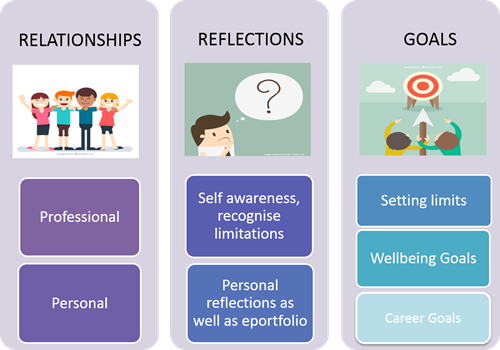Trainee information
Just like learning and maintaining clinical skills, we can develop our skills in resilience and stress management, and learn to use these when we encounter challenges during training.
Learning these skills is not easy; there is not a magic ‘one size fits all’, and changing thinking patterns can take time.
There is further information on these pages:
There are many web resources, books, apps and articles on resilience, positive thinking, stress management and personal development. These are not exhaustive suggestions but you may find something here to suit you or to inspire you to focus on your own wellbeing.
To maintain our balance through our personal and working lives, there are three ‘legs’ which keep us upright – Relationships, Reflection, and Goals. We are likely to thrive if all three legs are present – but if one is wobbly our resilience may be challenged. Consider what stops you from wobbling. Using these ‘legs’ to feel able to rise to the challenge of medicine helps to maintain a positive outlook, which will enable you to grow and develop as a doctor.

Relationships include personal or professional. Consider who you value in your life, who supports you, who you often turn to, for advice or just to discuss things. What do you need to do to maintain these relationships? Make time for these. When we are challenged in work, demands outside work will remain the same. Often our personal relationships with friends and families become stretched, just when we may need them most.
Reflections help us to increase our self-awareness of what the challenges may be for each of us personally. What you experience or find challenging may not provoke the same feelings in others. Spend time considering the challenges you find stressful and how these make you feel. Recognise your limitations and warning signs that your reserves of resilience are being challenged.
There are reflective tools that help explore emotional intelligence and its’ impact on behaviour. Many other simple reflective tools have been shown to help deal with challenging events. Explore what works for you – time and space to think and reflect may be found in talking, writing, drawing or simply thinking things through over a cup of tea.
Goal setting is a key skill to surviving challenging times, and one which comes naturally to most of us in medicine. But goals don’t need to be big, or long term. Spend time considering what you want for yourself, whether it is today, a month or 10 years away. What brings you joy? What do you want to be proud of? What should your world look like and how can you contribute to it?
Use SMART objectives to help define your goals realistically.
Goals come with a warning – as medics we are usually strongly commit ourselves. Be aware of your feelings if you don’t achieve a goal you set yourself. Don’t let it have a negative impact on self-esteem.
This page was last updated on: 21.06.2021 at 13.59